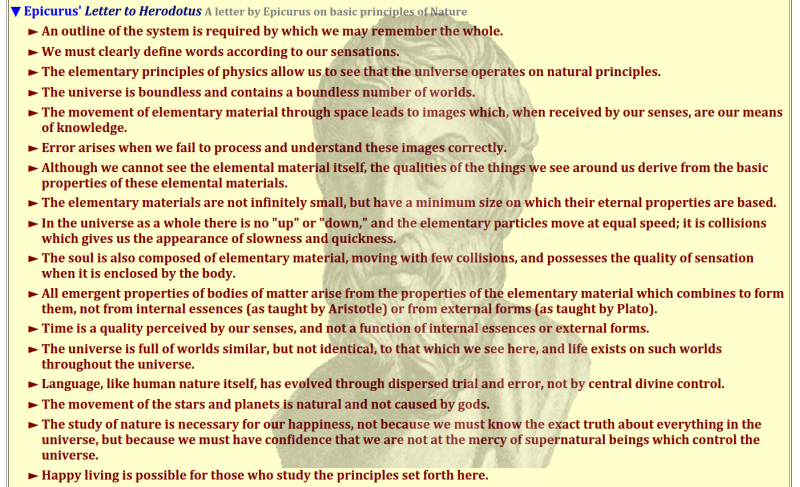Peace and Safety For Your Twentieth of September! – An Overview of the Letter to Herodotus
Peace and Safety to the Epicureans of today, no matter where you might be!
This month for the Twentieth, I offer a quick outline of the major points of the letter to Herodotus, which I think is one of the most under-appreciated of the Epicurean texts by those who focus their attention only on Epicurean ethics (and the letter to Menoeceus). Here, from my latest outline, is a list of key points:
► An outline of the system is required by which we may remember the whole.
► We must clearly define words according to our sensations.
► The elementary principles of physics allow us to see that the universe operates on natural principles.
► The universe is boundless and contains a boundless number of worlds.
► The movement of elementary material through space leads to images which, when received by our senses, are our means of knowledge.
► Error arises when we fail to process and understand these images correctly.
► Although we cannot see the elemental material itself, the qualities of the things we see around us derive from the basic properties of these elemental materials.
► The elementary materials are not infinitely small, but have a minimum size on which their eternal properties are based.
► In the universe as a whole there is no “up” or “down,” and the elementary particles move at equal speed; it is collisions which gives us the appearance of slowness and quickness.
► The soul is also composed of elementary material, moving with few collisions, and possesses the quality of sensation when it is enclosed by the body.
► All emergent properties of bodies of matter arise from the properties of the elementary material which combines to form them, not from internal essences (as taught by Aristotle) or from external forms (as taught by Plato).
► Time is a quality perceived by our senses, and not a function of internal essences of external forms.
► The universe is full of worlds similar, but not identical, to that which we see here, and life exists on such worlds throughout the universe.
► Language, like human nature itself, has evolved through dispersed trial and error, not by central divine control.
► The movement of the stars and planets is natural and not caused by gods.
► The study of nature is necessary for our happiness, not because we must know the exact truth about everything in the universe, but because we must have confidence that we are not at the mercy of supernatural beings which control the universe.
► Happy living is possible for those who study the principles set forth here.
Each of these bullet points is a heading for a section of the text, and you can check out any items that interest you by clicking on the full outline here.
Happy Twentieth!
_________
As Seneca recorded: Sic fac omnia tamquam spectet Epicurus! So do all things as though watching were Epicurus!
And as Philodemus wrote: “I will be faithful to Epicurus, according to whom it has been my choice to live.”

